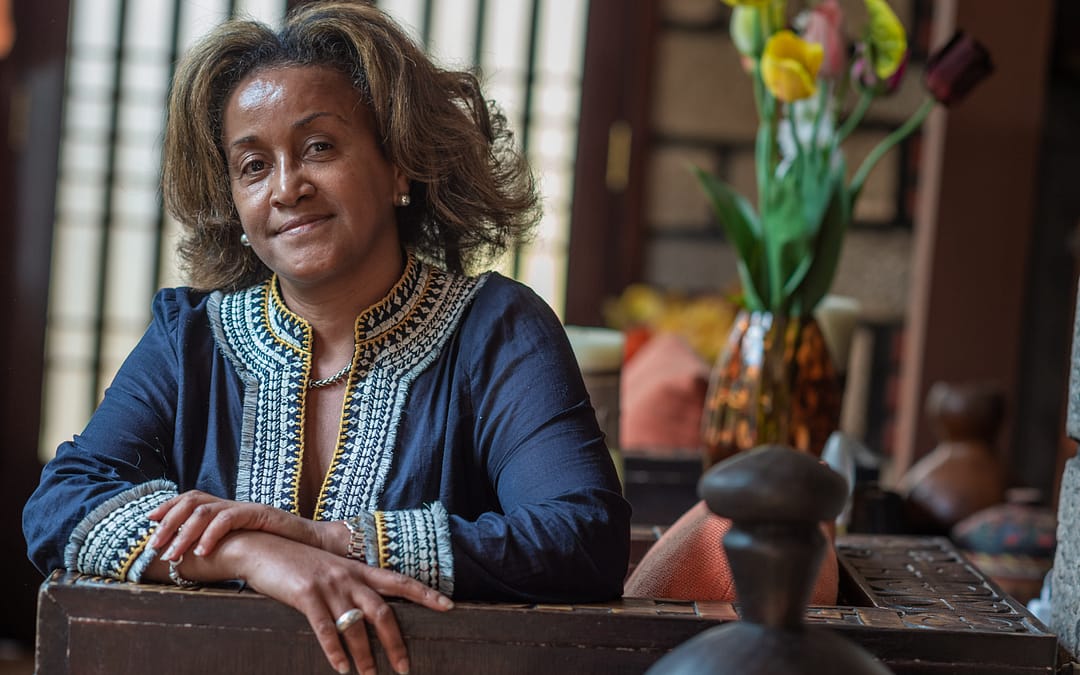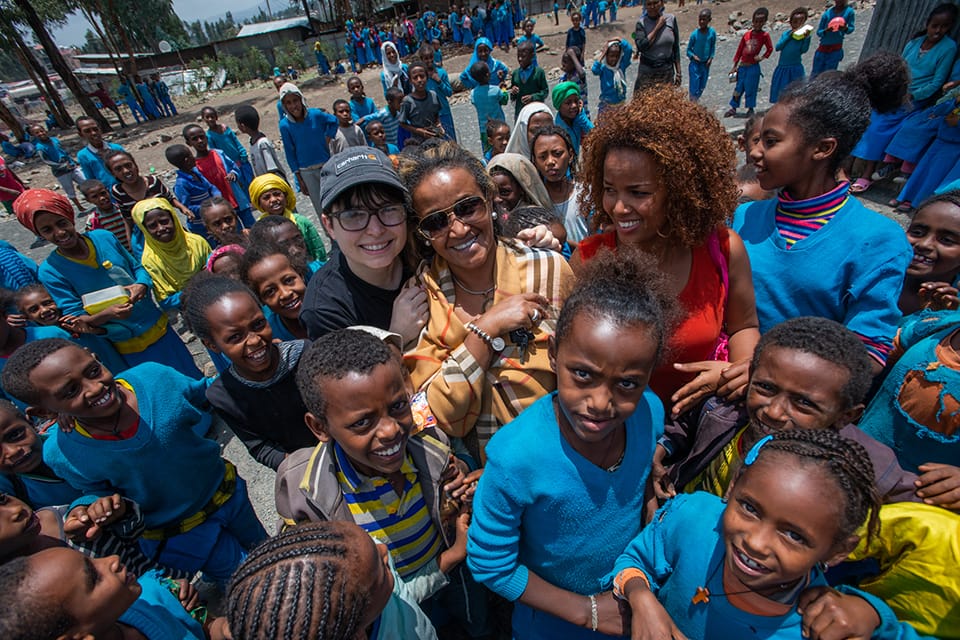
Seble Nebiyeloul
Seble Nebiyeloul
Co-Founder of the organization International Fund For Africa
Photographs by Jo-Anne McArthur.
Interview and text by Corinne Benedict.
Seble Nebiyeloul
Co-Founder of the organization International Fund For Africa
Photographs by Jo-Anne McArthur.
Interview and text by Corinne Benedict.
Seble Nebiyeloul was living in New York on 9/11, within walking distance of Ground Zero. The smell that hung in the air after the attacks is still etched in her memory, but she couldn’t pinpoint what it was until she passed a street vendor selling hamburgers.
“Animal flesh and human flesh, when you burn it, it’s one smell. That’s when I said no more animal products.”
“Instantly I said to myself, this was flesh I was smelling,” Nebiyeloul says. “Animal flesh and human flesh, when you burn it, it’s one smell. That’s when I said no more animal products.”
“When you start loving animals, you don’t have boundaries. When I became an animal lover, automatically, I loved any creature.”
It’s an ethos that came to define her work with the organization she co-founded in her native Ethiopia a decade later, International Fund for Africa, or IFA, which serves humans and animals alike.
Photo: Children wash their hands in preparation for the plant-based meals offered by IFA at their school.
Besides its sizeable vegan food and health program for school children, IFA’s work has included vocational training for people with limited economic opportunities, improved sanitation in schools, a program that helps girls make reusable menstrual pads, significant investments in maternal and newborn health care, mobile clinics for working animals, sterilization and vaccinations for street dogs, and more.
“When you start loving animals, you don’t have boundaries,” Nebiyeloul says.
“You love human beings because they’re human beings. When I became an animal lover, automatically, I loved any creature. I don’t care whether they’re poor, rich, white, black. That’s what loving animals did to me.”
Nebiyeloul was born in Addis Ababa, Ethiopia’s capital. Her mother was a secretary. Her father, vice minister of the private cabinet of Emperor Haile Selassie, was executed when Selassie’s government was overthrown in 1974. Nebiyeloul left for the United States a decade later when she was 19.
Photo: School children enjoying attention, and the cameras, at a school outside of Addis Ababa.
Nebiyeloul was born in Addis Ababa, Ethiopia’s capital. Her mother was a secretary. Her father, vice minister of the private cabinet of Emperor Haile Selassie, was executed when Selassie’s government was overthrown in 1974. Nebiyeloul left for the United States a decade later when she was 19.
Photo: School children enjoying attention, and the cameras, at a school outside of Addis Ababa.
She went to college in Kentucky and then studied health care administration at graduate school at the University of Maryland before settling in New York. It was the city’s many dogs, always out for walks, that helped ignite her love of animals. She bought a Maltese, but had to give him to a relative when her landlord said she couldn’t keep him. By then she was a vegetarian and had begun taking an interest in animal welfare and rights. Her next dog was a rescue. (About the seven dogs she has now, she says, “Without them, I couldn’t live my life.”)
Professionally, she climbed the ladder in the public health field. She was successful and happy but not fulfilled. When her job offered her another promotion to senior management, it didn’t feel quite right. Her cousin, Anteneh Roba, a physician then living in Houston, had been urging her to return to Ethiopia to help him with a nonprofit he was starting to alleviate some of their home country’s widespread poverty and suffering. It was the kind of mission Nebiyeloul had always wanted to take on.
“Yes, I was making good money, and I loved the work that I did,” she says. “But I’d done it. I’d proven to myself that I could do it – as a black woman, as a foreigner. I’d reached what I wanted to be.”
She moved back to Addis Ababa to get IFA off the ground in 2011.
Nebiyeloul loves to cook, and she’s good at it. As she began building IFA – organizational development is another of her talents – she also began working to expose more Ethiopians to vegan food.
Photo: A healthy lunch, provided by IFA, for impoverished children at a school outside Addis Ababa.
Nebiyeloul loves to cook, and she’s good at it. As she began building IFA – organizational development is another of her talents – she also began working to expose more Ethiopians to vegan food.
Photo: A healthy lunch, provided by IFA, for impoverished children at a school outside Addis Ababa.
“A lot of people came and said to me, ‘If we knew how to cook like this, we would never eat meat, not for animals but for the health reasons.’”
She started with cooking demonstrations and then began serving vegan brunch at yoga classes that a friend was teaching. Nebiyeloul describes her food as Ethiopian adapted to be vegan, with influences from places like Asia, Spain, and the US. She goes for mostly fresh ingredients, lots of spices and herbs, and little salt.
The reaction to her cooking was almost always the same, she says – people were shocked that vegan food could be so delicious.


IFA’s vegan school food program, which uses Nebiyeloul’s recipes, now serves two meals a day to hundreds of children. It also provides employment for 10 cooks whom IFA trained in a style vastly different from most professional Ethiopian kitchens.
“I’m trying to teach the younger generation that in order to live, you don’t have to eat animal products.”
Nebiyeloul says it is an uphill battle in Ethiopia, where animals are mostly regarded as being here to serve humans.
DONKEY SANCTUARY CLINIC
Photos: Burlap sacks are shared with equine owners, to be used on the backs of the animals for comfort when they are carrying loads.
“Meat is a major part of our food, especially during the holiday time. It’s part of the culture. You have to kill animals. Usually I travel during that time out of Ethiopia. I find it difficult to stay here,” she says. “Animal welfare is a little bit acceptable in this country – I would say, five percent. Animal rights, forget it. It’s a very difficult concept.”
Nebiyeloul draws a line in trying to persuade people to be vegan. Mostly, she prefers to limit her efforts to setting an example, using food rather than words. Vegan cooking is her activism, she says.
“I always respect people’s space. I start discussions only when people express an interest.”
Seven years after its founding, IFA continues to evolve. The organization coordinates closely with A Well Fed World and is working toward sustainable solutions to Ethiopia’s poverty, namely holistic programming that addresses root causes, Nebiyeloul says.

IFA’s school eye health project has provided vision screening for more than 26,000 students, glasses for more than 600, and eye-related disease treatment for hundreds of others.
More than 6,000 girls now have reusable menstrual pads, helping to keep them in school, and IFA is preparing to launch a new mushroom production unit to introduce the vegan staple to kids, generate income for IFA’s programs, and serve as a vocational training site for youth who’ve dropped out of school. Recently, IFA responded to a call for humanitarian aid for victims displaced by ethnic violence, providing food, clothing, mattresses and diapers for families in Ethiopia’s Oromia region.
Photo: Young women learn to design and sew their own sanitary pads.
More than 6,000 girls now have reusable menstrual pads, helping to keep them in school, and IFA is preparing to launch a new mushroom production unit to introduce the vegan staple to kids, generate income for IFA’s programs, and serve as a vocational training site for youth who’ve dropped out of school. Recently, IFA responded to a call for humanitarian aid for victims displaced by ethnic violence, providing food, clothing, mattresses and diapers for families in Ethiopia’s Oromia region.
Photo: Young women learn to design and sew their own sanitary pads.
As for the future, Nebiyeloul dreams of someday opening a vegan restaurant and a sanctuary for unwanted and abused donkeys and horses.
“As you grow older and achieve goals, you start to look back and say, ‘What have I done in life?’ I want to give to any other citizen what I got from life,” Nebiyeloul says.
“If you deal with people the right way, the world will be the right place to live.”
Learn more and support the International Fund for Africa.
Photos and interview by Jo-Anne McArthur. Text by Corinne Benedict.




















































